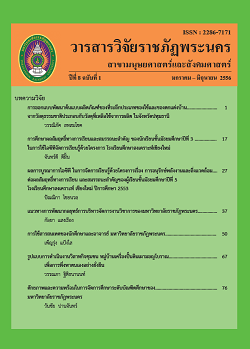วัฒนธรรมวิชาการของบุคลากรคณะครุศาสตร์หรือศึกษาศาสตร์ ในสถาบันอุดมศึกษา
Main Article Content
Abstract
ผลการวิจัยพบว่า
1. วัฒนธรรมวิชาการของบุคลากรคณะครุศาสตร์หรือศึกษาศาสตร์ในสถาบันอุดมศึกษา ในภาพรวม อยู่ในระดับมาก เมื่อพิจารณารายด้านพบว่า อยู่ในระดับมาก 5 ด้าน ได้แก่ ด้านการจัดการเรียนการสอน ด้าน การบริการวิชาการ ด้านการส่งเสริมศิลปวัฒนธรรม ด้านการพัฒนาอาจารย์ ด้านวิถีชีวิตของอาจารย์ ส่วนด้าน การวิจัย อยู่ในระดับปานกลาง สำหรับนักศึกษา ในภาพรวมอยู่ในระดับมาก เมื่อพิจารณารายด้าน พบว่าอยู่ใน ระดับมาก 4 ด้าน ได้แก่ ด้านการจัดการเรียนการสอน ด้านการบริการวิชาการ ด้านการส่งเสริมศิลปวัฒนธรรม ด้านวิถีชีวิตของนักศึกษา ส่วนด้านการวิจัยและด้านการพัฒนานักศึกษา อยู่ในระดับปานกลาง
2. ปัจจัยสนับสนุนให้เกิดวัฒนธรรมวิชาการที่พึงประสงค์ของบุคลากรคณะครุศาสตร์หรือ ศึกษาศาสตร์ในสถาบันอุดมศึกษา ได้แก่ นโยบายจากภายนอก กฎหมาย เกณฑ์มาตรฐาน ระบบการติดตามและประเมินผล กลไกการบริหารจัดการภายในองค์กร ประวัติความเป็นมาและชื่อเสียงขององค์กร การให้การ สนับสนุนการวิจัย แบบแผนการจัดการเรียนการสอน การบูรณาการการจัดการเรียนการสอนเข้ากับการวิจัย การบริการวิชาการ และการเผยแพร่ศิลปวัฒนธรรม การเข้าใจและเข้าถึงวัฒนธรรมวิชาการของผู้มีส่วนได้ ส่วนเสีย
3. แนวทางปรับปรุงและพัฒนาวัฒนธรรมวิชาการของบุคลากรวิทยาลัยการฝึกหัดครู มหาวิทยาลัย ราชภัฏพระนคร ได้แก่ พัฒนาแนวทางการจัดการเรียนการสอนโดยมุ่งผู้เรียนเป็นสำคัญ ด้วยการให้ความสำคัญ แก่กระบวนการพัฒนาหลักสูตรและเทคโนโลยีสนับสนุนการเรียนรู้ พัฒนากลไกการจัดการโดยการวางแผน ยุทธศาสตร์และการดำเนินงานตามแผน การกำหนดเป้าหมายการดำเนินงานที่ชัดเจนตามแบบอย่างที่ ประสบความสำเร็จ
Academic Culture of the Staff at Faculty of Education in Higher Education Institutions
This research investigated to operate academic culture and factors supporting academic culture of the staff at faculty of education in higher education institutions in order to search for authentic method to improve academic culture of the staff at all faculties of education and College of Teacher Education of Phranakorn Rajabhat University, in particular. The population composed personnel from 58 universities of 3,967 administrators and academic staff, 1,634 supporting staff, and 88,302 students. The sample derived from simple random sampling by defining sample size related to Yamane principle, consisted of 42 administrators, 386 academic staff 70 supporting staff and 873 students. The instruments were a set of questionnaires, in-depth interviews and group discussions. Two sets of 5-scale questionnaires covered 5 aspects and other two sets of questions for in-depth interview were constructed by the researchers and evaluated for content validity by five experts. Descriptive statistics namely percentage, mean, and standard deviation were employed to analyze and describe the data while content analysis was used to analyze and synthesize the answers from in-depth interviews.
The quantitative results were as follows:
1. The overall aspects of academic culture of the academic staff were high, whereas 5 aspects (teaching and learning, academic service, cultural support, personnel development, and academic staff’s way of life) were high and the aspect to research was average. The overall aspects on academic culture of the students were high, whereas 4 aspects i.e. teaching and learning, academic service, cultural dissemination, and students’ way of life were higher and other two aspects i.e. research, and student development were average.
2. The qualitative results on factors affecting desirable academic culture were as external policies, laws, standard criteria, and monitoring and evaluating systems, mechanisms for organization management, history and reputation, research support techniques, teaching and learning styles, integration of teaching and learning with research, academic service and cultural dissemination, and understanding of academic culture of the stakeholders.
3. This research proposal guidelines for academic culture development for personnel of the college of Teacher Education as follows: Student – centred instruction should be developed, Curriculum development, instructional technology should be put in to emphasis through a strategic plan and implementation. A road map should be made.
Article Details
Each publish articles were copyright by Phranakorn Rajabhat University
Any contents which appeared in each articles in the journal were authors personal opinion. It did not relate to Phranakorn Rajabhat University and other instructors in the university. Each authors would take responsibility on their articles. If there are any mistake, the authors will take responsibility themselves


